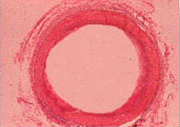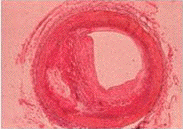|
|
Fat |
|
|
But there are many kinds of meat. Are they all equally bad or are some better than others? I'd often heard that red meat (beef, pork, etc.) is the worst because it has a lot of saturated fat, the "evil" fat that's solid at room temperature (gross!). However, according to researchers such as David Gabbe, poultry and fish are just as bad. I decided to find out more about just what's wrong with fat, and what's dissimilar between the different kinds. Cholesterol is the type of fat that enters the blood stream. A certain amount of it is necessary for a properly functioning body (humans are making it all the time) but getting too much has some very negative results. Extra cholesterol in the blood stream gradually settles on artery walls, slowly hardening them and making it more difficult for blood to get through. If cholesterol levels remain high, the process continues to the point of complete blockage or rupture. This is what causes all heart attacks, strokes, paralysis, and other fatal diseases. And guess what: cholesterol is only found in animal products. There's not a trace of it in any plants, so switching to a plant-based diet automatically means you're safe. In most cases. This is where saturated fat comes up: it turns out that saturated fat increases the blood cholesterol level -- with the same effects that come from just eating food with cholesterol. Since red meat has both saturated fat and cholesterol, it basically contains the "worst of both worlds." But according to David Gabbe, chicken and fish contain close to twice as much cholesterol as red meat -- so overall they're pretty much just as bad. "There's not much of a difference whether you eat beef, bird, or bass" (Gabbe 79). But there definitely is a difference between eating meat or plants. Everyone needs a certain amount of calories to survive, so the key is in how we get those calories. Virtually all nutritionists and government agencies recommend that adults consume no more than 30% of their calories from fat. Most researchers who don't receive funding from the meat industry recommend no more than 10-15%. But most meats contain more than 75% of their calories from fat (Gabbe 185)! It's pretty easy to see how meat-based diets can completely throw off the recommended fat-calorie balance. Indeed, "according to The Journal of the American Medical Association, a vegetarian diet can prevent 97 percent of coronary occlusions [blocked arteries]" (MeatStinks.com). |
||
|
|
Nutrition -->
Introduction
| Studies
| Fat | Nutrition
| Poisons
| Conclusion
| Bibliography
![]()


